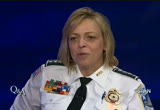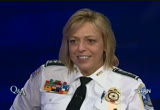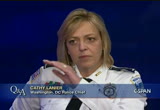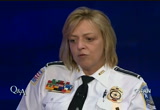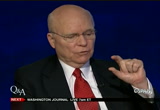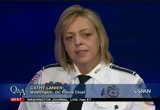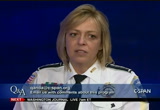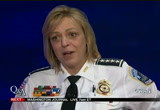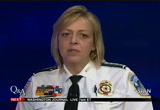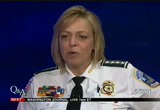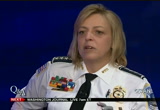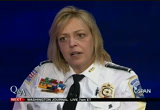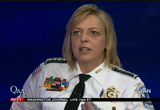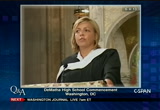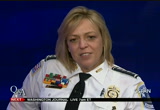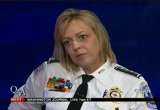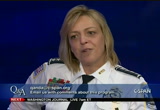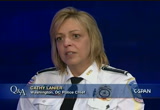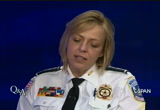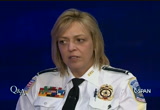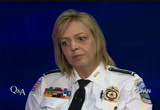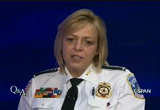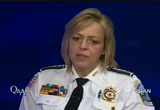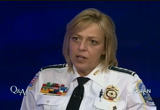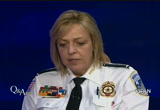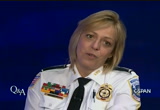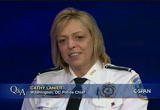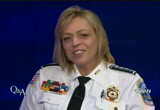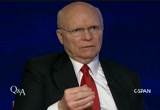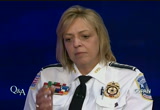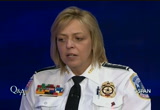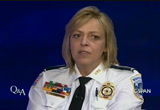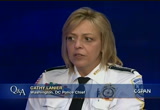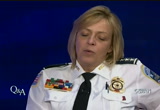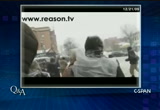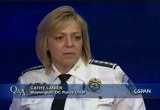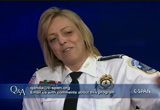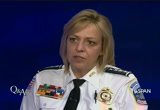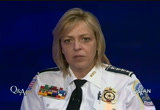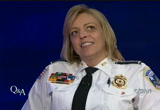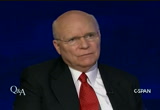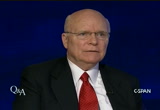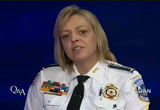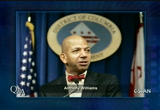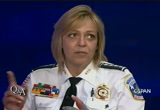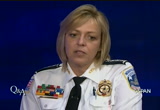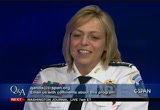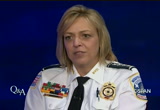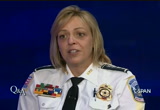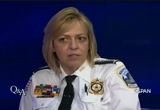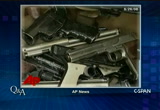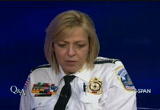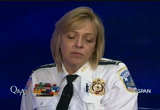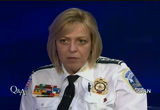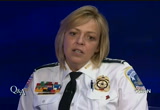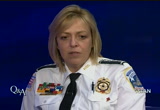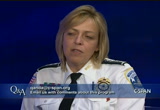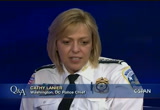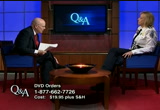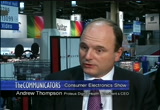tv Q A CSPAN January 28, 2013 6:00am-7:00am EST
6:00 am
it is such a big part of reporting in washington d.c. every day, we deal with a lot. >> what are your own personal rules with dealing with an interview situation? >> one thing i have learned is that in law enforcement, when we get asked questions, we always say, no comment. we cannot talk about that. my rule of thumb is i always try to tell you what i can tell you. there is always something i can tell you. if i cannot comment on -- for example, there was a case where there was an allegation an officer made a threat regarding the first lady. clearly, there is an investigation going on. what i can do is talk about, here is the process. we will do our investigation, the secret service will do a threat analysis investigation.
6:01 am
it will be passed on for this and this. i try to find what it is i can tell the press because they have a got -- a job to do. that is my rule of thumb. >> i have a piece of people -- paper here. i go back to 1993. were you on the force? >> i was. >> there were 454 murders in the district of columbia. last year, 2012, there were 88. what happened? >> a lot of things have happened. the initial decline of the 500 down to the 200 range, that decline over a 10-year period was rolling down on the cocaine epidemic.
6:02 am
that was a 20-year run of sheer hell. the violence, we had 200 open air markets in the city. there would be drive bys and six or seven people would be shot and killed in a single incident. as the crack cocaine epidemic started to wane, we went down to the 200 range and we stayed there for a time. >> why did it wane? >> drugs tend to spike in popularity and remain there and run 20-year cycles. there are still people who use cocaine and crack cocaine. it is nowhere near where it used to be. with the absence of that driving the violence, i think that dropped it down. we got stuck there for a long time. even when i took over in 2007, we were 169 in 2006, 186 in
6:03 am
2008. we were consistent with gang violence. -- we were persistent with gang violence. that was born and accelerated during the crack cocaine. even when crack cocaine went away, the gangs did not. coming down from 186 to where we are now, in four years, a 54% drop in murders, it has been constant focus on our gangs, the illegal gun offenders, and really staying focused on those two things and bringing in the community to work with us. that has been key. >> the mayor of this town in 1989 was marion barry. i want to run a short video clip of him speaking at the press club. [video clip] >> nearly half of 372 homicides, -- the targeted killings occurred
6:04 am
east of the anacostia river. communities plagued by high unemployment. poor housing. social ills that have had a negative affect on the poorest among us. look at a map. you will see 50% of the open air drug markets are in two districts. the fourth and seventh districts. these murders are targeted killings. >> what did you hear there and what were you doing then? >> i started in 1990. when i started there right after coming out of the academy, we had a week's worth of rights -- rights -- riots. in mount pleasant where the entire area was completely out of control,they torched police cars.
6:05 am
that is a very accurate description of what i remember. >> what was it like when you started? >> the city was a different place. financially, the city was in shambles. i walked for a few years because we did not have cars and they were in poor shape. the first car had 127,000 miles on it. financially, the city was broken. it made it challenging. i enjoyed walking on the foot beat. that was my favorite assignment in my entire career. i learned more about policing just being embedded in the community and knowing everybody. being sensitive to things and i would notice if a car normally parked in a certain place at a certain time, it would catch my attention if it was not there. that is one of the most effective forms of policing.
6:06 am
i learned of the most doing that. murders every day, one, two, sometimes three murders. >> when i first met you today, my first thought was, i did not know she was so tall. >> everybody says that. i am 5'11". >> what part has that place? >>i am skinnier, too. [laughter] >> what effect has your being tall had? >> i cannot ever think of a time my height has played more of a role than people saying, gosh, i did not know you were that tall. >> how old are you now?
6:07 am
when mayor adrian fenty was elected, i remember that you, michelle rhee, and mayor fenty were all under 40. >> i am 45. i remember the headlines. the press. i remember there was an article in "the washington post." a 36-year-old mayor and a 39- year-old police chief. the bottom line was, do not blow it. a lot of pressure. job? >> i had been on 17 years at the time. i was the district commander in charge of the fourth district. i was one of the youngest district commanders in the city. adrian took over and he was just like he was at the mayor -- as the mayor.
6:08 am
he was big on accountability. we had a lot of the same personality traits in terms of really focusing on accountability and responsiveness. we worked very well together. i did not see him after i left the fourth district and went to special operations. not for a couple years. when he was running for mayor, he visited a couple times. i think it was the sheer fact that adrian knew how i police. he knew how i managed. he knew my priorities were similar to his. i said, you will take a huge hit if you appoint me. i am 39-years old. i would be a commander so i would be jumping a rank. he said, i do not care about any of that. i know you can do the job.
6:09 am
>> people behind your back call you blondie? >> that is the name i got on the beat. people would yell it out as i go down the street. >> does it bother you? >> no. a nickname. >> an officer of yours came up and said it. >> i have been on 23 years. i am the average member of the metropolitan police department. they are my group. we came on in 1989, the vast majority of us. i worked alongside the vast majority of the people in the police department. i know them by first name, i know their habits, i know who is a good cop and who is not as energetic as other cops. i know them all. that is a huge advantage for me.
6:10 am
>> who is your boss? >> a couple of bosses. the mayor. the city administrator, and the deputy mayor. >> if you look on the list of how many police departments there are in this area, 25. >> i think it is 34. >> i could only find 25. >> the supreme court had a police department. other than the metropolitan police, and the u.s. park police, and the metro transit police to a certain extent, everybody else is very narrowly confined. park police really polices the park areas. we are the only in the city -- i put it this way, if you dial 911, it will be my phone that rings. >> what happens if something
6:11 am
happens to a public official and they must go to the hospital? you have had many cases of that over the years. who is in charge the? >> it depends on who it is. if it is a protectee of the secret service, they would have support. if it is a state department -- the metropolitan police is the only agency that can investigate. >> what's the best training for a policeman? >>walking a foot beat, you learn how to develop sources, how to use information. you learn how to leverage relationships. you'll learn how to develop sources. that is the key. if people in the community trust you, they will tell you when there are things that are
6:12 am
happening that are not yet crime so you can intervene. do it. i really learned the most in my career from those relationships. >> why did you a couple years ago give a commencement address at a high school in 2010? >> my son, who i am so proud of, graduated there. that was the most stress i had been in my life giving a speech. a high school my son graduated from. as a mom, it was very stressful. >> let's look at a little bit of the speech. [video clip] >> high school back in the 1980's. kids in my neighborhood were bused into another neighborhood for school. that is where my life began to change. i was bused to a neighborhood and each day, from the first day, when the kids on my bus got off that bus, we will
6:13 am
promptly jumped by the neighborhood kids. they clearly did not think we belonged there. this went on for two years. i began to skip school, miss class, get into trouble. i went from a straight a student to failing the eighth grade. it is why i was so impressed to have that many days without a day off. no child can learn in an environment where fear generates all day long in school. >> jumped? why? >> that is one thing that is still pervasive. i don't think that is unique to washington, d.c. it drove a lot of the gang issues we had up until today. neighborhoods in washington d.c. seem to be territory, owned by the people in the
6:14 am
neighborhoods. it is neighborhood against neighborhood. it was not our neighborhood. every day, there were busloads of kids who came from two different areas outside the neighborhood. both buses. eventually, we figured out we could join forces and jumped them when we got off the bus. after we got better at it. it was a horrible experience for a kid to try to go to school and learn in that environment. that is why i put so much emphasis now on making sure kids can go to school safely. >> how many kids do you have? >> one kid. >> your personal story everybody wanted to talk about, you said, i do not want to be one of those who are on talk shows. for people who have never heard this story, what is it? what happened when you were in junior high school?
6:15 am
>> that was the hard part about the press. my personal story was more important than my first year as police chief in washington d.c. the interest is i was -- i ran away from home, and dropped out of school, 15 years old, got married, had my son when i was 15, i was a single mom with a ninth grade education when i started. i started with a ged. when i came to metropolitan. over the last 20 years, because i made a great decision to drop out of school, i spent 20 years trying to catch up and go back to school. now i have two master degrees. it was the hard way. home? >> i thought i knew everything. i was a teenager. i was failing school because i had been skipping school. i thought i was in love. i wanted to get married. and i got pregnant. >> when did you live at that
6:16 am
time when you got married? -- where did you live at the time and get married? >> a small apartment outside washington d.c. >> what happened with your relationship with your parents? >> my mom. she is the sole reason i am where i am today. i was raised by a single mom. she was devastated. she was a wonderful mother. right. >> yes. she lives with me now and i take care of her. she was wonderful. she stood by me when i got divorced and i moved back home. my mother had very little money. we were poor growing up. she took me and my son back in. what little she had, she shared with us. she helped me raise my son. she helped me get my son in a private school. she made it possible for me to be where i am today. she helped me pay bills with what little she had. my mother has been great. >> what were those early jobs
6:17 am
you had to make money? >> i was a secretary, and my mother taught me how to type at home. i worked as a waitress. i started working when i was 15. i worked two jobs the first three or four years. a secretary during the day and a waitress at night. >> what has the story done for your relationship with the average person out there? >> as horrified as i was, the verse story came out -- the first story came out right after i was named. i was horrified. some of the headlines in the press, there was one -- teen welfare mom taught to be nation's top cop. if i could get my hand on the headline writer, it would not be good. over time, for the people i interact with and work with every day, the people i try to help, i think for those folks, they do not see it as bad at all. they see it as opportunities
6:18 am
that you can make it regardless of your circumstance. it gives me perspective. a lot of people are poor and living in these communities through no fault of their own. we grew up very poor and my mother did nothing wrong. she was a great parent and worked hard. i think it helped some for me to relate to people and them to me. brothers are firemen? >> yes. my father was a firefighter. he was a deputy chief outside the district. my oldest brother just retired. my youngest brother a police officer. >> what influence did that have on you getting on the police force? >> probably a lot. i did not have a lifelong dream to be a police officer. when my other brother started in the police department, i was not interested. i had a good job and i was working and i liked the job i had. i remember when they had the
6:19 am
big push for police officers. there was an advertisement in the paper. a mass hire. they were looking to hire a thousand people. what caught my eye, because i only had a ged and i was trying to go back to school to put my son in a better school. they said, tuition reimbursement for college. that is what got me. i was taking one or two classes at a time at the community college. it would have taken forever. >> you went to johns hopkins. >> my masters. i got my second masters elsewhere. from the naval postgraduate. >> i got a quote from something you said in 2005 before you became chief. "no experience in my life has had more of an impact on doing my job than going to israel." explain. >> the former chief asked me to
6:20 am
take over the special operations commission after 9/11. you wanted me to recreate the capabilities of the police department in terms of the homeland security counter- terrorism. i traveled all over the world looking at, studying, homeland security issues, intelligence. i took a 10-day trip to israel. i took a lot of notes when i was there. 88 pages. i met with a lot of the officials in israel. just watching the way of life in israel, there was a bombing when i was there. watching the way of life for the people in a place where terrorism is every day was just one of the most eye-opening things for me in terms of trying to develop policy for the metropolitan police department.
6:21 am
i never want to see our country and city living like that. it really inspired me to put together a very strong capability inside the police department. >> what did you change? >> everything. culture. it should have come after oklahoma city and it did not. we did not have the wake-up call until 9/11. we should have done it long before that. completely changing the culture of local law enforcement to understand our duty and our responsibility. it is a big one. terrorism. it has evolved since 9/11, but it involves the same thing. we have state-sponsored terrorism, all those things. evolved over time. understanding that, regardless
6:22 am
what the threat is, local police have a huge role. preventing it, to begin with. we have to be prepared so that when something happens, no additional loss of life happens because we are not prepared. >> can you tell me something that has gone on on a daily basis all the time that we cannot see that is not a violation of the intelligence that goes on here? >> i have about 15 people that are assigned inside of different agencies, fbi, a task force, some of the other counter-terrorism centers where we have embedded our offices for information. a week with classified information. i will always do that. i want to know not just what is happening in the region in terms of the types of cases, but also looking at global issues.
6:23 am
they all have an impact or could have an impact here. that drives how i train my police officers. if there are new patterns emerging and terrorism, i immediately have to shift gears and shift my agency's capability. that goes on just about every single day. >> how often do you hear of a terrorist threat in the area and you stop it and you never tell us about it? >> hard to measure. incidents here. there are things we do not share and we cannot. for a lot of reasons but things we cannot share. >> going back to the headlines, you say, you like to give the
6:24 am
information, but how often do you say, no comment? >> back on the 10-year anniversary of 9/11, there was a legitimate threat lurking. i made a decision after a briefing to send special teams out and cover certain areas. critical infrastructure. how do you do that? how do you mobilize everybody on a 12-hour shift and have an incredible shift in visibility? the press says, why are you doing this? you cannot say. i find ways to message that. knowing that will be a request from the press, i make the notification to the union so it knows, there is a reason i am doing this, i cannot share it
6:25 am
with you now. also knowing the threat would go public, i say, this is the anniversary of september 11. i had to say something. the threat was revealed a day later. i could not do that without answering the press. >> other than a few blogs, the only place i can find anybody speaking negatively about you is the chairman of the police, the union, kris baumann. -- the chairman of the fraternal order of police, the union,who is he and why is he so irritated by you? >> that is the way he is. he did the same things with ramsey. that is the type of leadership he does. he does exactly the same thing. he likes to constantly attack management.
6:26 am
he likes to constantly attack me. >> were you a part of the union? >> of course. all my friends are. i do not think of my police department as union and nonunion. they are all mine. his job is the union chairman. his tactics are attack, attack, attack. i do not think he personally does not like me. that is just his style. >> let me read a quote. "this is an administration without honor and the leaders are out to enrich themselves at the expense of the public." >> that is classic kris. that is just kris. i looked back on some of his old articles. he has them up on his website. constant attacks on chief ramsey. ramsey fired back hard. i cannot get caught up with that.
6:27 am
i have a police department to run. i cannot let his tactics to draw negative press. all of his attacks tie into negative press to the agency. i have to focus on keeping my police department going forward. if i get sucked into that, i am just hurting my agency. i cannot get sucked in. it is hard sometimes. you want to defend yourself. he is saying stuff that is just not true. the press is always looking for somebody to give a negative comment. that is where they will go. i know that. it's just life. >> you are in a city, the district of columbia, and we saw the mayor. he went to prison. there was another city council member who went to prison. what does that do to you?
6:28 am
how do you deal with that? are they your bosses? >> i work with the city council members quite a bit. i do not work for them. i work with them. that body is there to help make the city function well. it is very distracting, especially for the police department when you are a police officer and there are elected officials. it is embarrassing. i think back to the guys when marybeth -- marion barry was going through his criminal issues. this is the guy that signs your paycheck. i try to keep the police department focus. we do not have time. we have got to stay focused. the police department is a shining star in this city. we have integrity and an incredible reputation for customer service and responsiveness.
6:29 am
we do a great job of fighting crime. stay focused on what you have to do. don't get distracted by all that crap. we tried not to get sucked into it the best we can. >> is there a police department around the country you admire for doing innovative things you have taken some ideas from? >> i constantly look. i have searched for things for me that other agencies are doing. there are a lot of innovative leaders out there are around the country. there are a couple of things. when i first started the homeland security terrorism business here back in 2002, i looked a lot at what note -- new york is doing. you have to remember there are some things that are very effective in one jurisdiction and you cannot pull it off in others. >> you did a study when you were in postgraduate school that you published.
6:30 am
you talk about the 9/11 commission. they should have asked why the officers did not know the terrorists or operating in the community. did you ever get an answer? >> this is what i think of every day. i wrote that before i was the police chief. this is something in my mind every day. every time i am briefed on a threat, whether it is -- even if during the pre thing -- a briefing, we do not know the credibility yet. even though the intelligence community that is sharing the information does not feel it is something to get ramped up again -- about yet, i take some action on every single threat that comes in. i do not care if it has been deemed credible yet or not.
6:31 am
i will take some action. i will not be sitting in front of the next 9/11 commission and somebody says, what did you do when you got the information? i always take action. intelligence is intelligence. it is not perfect. it is a weather forecast. you can tell me it will be cloudy today and there is a 50% chance of rain. i will take my umbrella. that is my philosophy. it may not rain at all. i will take my umbrella. >> how much income -- of a to 9/11? >> people ask often how much we really get credible threats. it is not as much as people think. in the 12 years i have been in the lead for the intelligence for the city, i have seen about
6:32 am
10 times when there was really truly a case where there was a threat here to washington d.c. the fbi does a fantastic job. they have intervened on a couple here. mostly a few years ago when a person with targeting the capital. it is not every day. the threats come and go. we have spikes that come in. we have occasionally multiple sources of threats. it's ebbs and flows>> what is the worst thing somebody can say to you on a given day. >> in terms of threats? >> when do you say this will not be a good day? >> there are a lot of things. >> what kind of things are there? >> i probably involve myself more than a lot of chiefs. the things that room my day, credible threat streams, --
6:33 am
obviously. that ruined my day, credible threat streams, obviously. officermisconduct. i have a very aggressive position that i run my internal affairs and i actively do integrity checks and look for misconduct and corruption. when we get cases where we have corruption, that is one of the things that bothers me the most. those are the two biggies. >> i want to show you video i know you have seen before. a snowball fight. >> yes. >> let's get your reaction. [video clip] >> [indiscernible] >> he has got a gun. >> [indiscernible] >> he has a gun in his hand.
6:34 am
it does not seem like a good idea. those guys are laughing. about to get shot. do not shoot anyone over snowballs. >> what is that? >> this is one of the places where i learned a lesson in terms of the press. this was during a big snowstorm where we had a large group of people who, through social media, had organized a very large snowball fight. it was a serious storm. lot of areas. this was an off-duty detective driving through the area. he had a nice car, and he was
6:35 am
getting pelted with snowballs. he stopped the car and gets out. he is not in uniform and nobody knows he is a police officer. he gets pelted with snowballs. he draws his weapon. when the first calls came in from the press, we heard you have an officer drawing a gun during a snowball fight. i said, i do not have time to run out and give a statement right now. i said, look at what the video is and get a statement. i look over the shoulder and the first video we look at, the officer dropped his cellphone and we thought that was not a gun. i tell the chief, it is not a gun, but a cell phone. and we see the other video later. the lesson was learned. you really need to know all the information.
6:36 am
it was a nightmare. i got hundreds and hundreds of e-mails and calls and letters. people were outraged over that. that was a media nightmare for a year. >> i got terms when i was doing research on this interview that i wanted to ask you about. there are things you used in law enforcement. what is zero tolerance? >> it became very popular after the beginning of the transformation of new york. the chief, the big story was the squeegee guys. he had a zero tolerance approach to policing in new york. it worked very well. they went after minor offenders to reduce the disorder and crime and it worked very well. it took off in terms of a trend in policing. it is not one i think works well here. we have done it and i think it
6:37 am
has some of the opposite. >> why here? >> back to my first statement when we first opened up. my philosophy with our community here is -- we go into a community where there are a lot of murders and shootings and robberies. we go in and we fled the area with police and we lock up anybody for any violation of law. they get an expired gun permit and take him to jail. what we have forgotten is even though this is the area with the most violence, it is the area with the most victims and witnesses. they will not talk to you. the perception in anacostia was chief, the perception was, they locked up our son for not having a permit, they locked up my grandmother for an open alcohol containers, the perception of the community was we do not care.
6:38 am
i put a foot patrol officers there, told the zero tolerance teams out of there and people polled the zero tolerance teams out of there and people start to get to know the police, they know you by name, they start to provide information. there was one community there that drove homicide. year after year. after two years with foot patrol, jotted down to one murder in an entire year. -- dropped it down to one murder in an entire year. it alienates the people we need. >> how can somebody tell, especially another police officer that works for you, when you are mad? >> it depends. the most opportunity for people to see me mad is my crime briefing. if i have somebody who, in a crime briefing, we discovered
6:39 am
they had information they did not share with other people who needed it and an additional crime could have or did occur, i think my body language makes it obvious. i do not have any problem telling people. especially if they are people i appointed in positions to make sure these things are getting done. i think it is pretty obvious that person will not be there very long. i will move a person in a heartbeat if they are not doing the job. >> as the person in command, what would be your recommendation to others who are in command for the first time in the way you treat people and how tough you have to be? >> for me, all the people -- my entire executive staff, we came up through the ranks together. we competed together. them.
6:40 am
i think the thing that is most important is everybody who works for me knows you can be my best friend. i have had areas where i have had the will be my best friend for a long time. if you are in a leadership position and are responsible for a particular area and you are not making it, you have to move. it is not personal and it is not about you. i have to get the job done. people have been trusted me. i have to get it done through others. it is not an easy thing. it is what is required if you will be a leader. that is accountability. >> i saw a lot of stories about your salary. did that tick you off? >> only in the sense --you make $250,000. >> a lot of the stories, they talk about the top three salaries in d.c.
6:41 am
there is myself, the schools chancellor who makes more than i do, and the city administrator. they refer to me by name in that article and never mentioned the city administrator who is male and makes more than us. i thought it was sexually biased. if you compare my salary to other major city chiefs, in particular, across the city, my salary does not stand out at all. i wonder if i was mail if it would matter. >> who gets the most money as a police commissioner. >> i do not know who it is now. i know chuck in philadelphia is up there. -- chuck ramsey,chicago is up there. if you compare the size of the force, there are police chiefs who have police department's a quarter of the size of what i have that are making very close to what i make.
6:42 am
you have to weigh a lot of that stuff, too. >> several years ago, 20 years ago, the population breakdown in this city was 70% african- american. it is now 50% african-american and 38% caucasian. what happened? >> the population has shifted and i would say that shift occurred, at least initially, it was fairly gradual. it started 10 years ago. there has been an acceleration in the last five years. i think the city, under the last administration, the mayor put together his vision for the city to start revitalizing economic development. he did projects and things like that to try to get the city back in a good direction. he did. in the course of doing that,
6:43 am
one of the things i think was a good decision is moving away from poverty to the section 8 model in place now. a lot of those public housing complexes that really clustered a lot of poor folks and poor living conditions, to get rid of those, so as toney moved through his fusion, a lot of the public housing complexes were destroyed. i think some of those are dispersed around the city now in section eight properties. some of those took properties outside the district. the more the district developed and there is a lot of development going on here, it becomes more expensive to live here. there are 53 cranes in this city doing their job right now. i think you will see a lot more of not just african-americans, but the lower income folks. the population is skyrocketing here.
6:44 am
i did an 18 month analysis of economic development because it impacts my policing. i put together a strategy. in the next five years, policing will look different because of the development in the city. it's amazing. >> the president says he wants more police out on the beat. does that make sense? >> it is where they have to be. >> do you need more? >> of course. that was the whole purpose of my study. in five years as the chief, i never went out -- we monitor a lot of things not traditionally monitored by the police. the type of development going on will impact were closed for us. -- work load for us. with the population skyrocketing the way it is, with the entertainment venues skyrocketing, our nighttime population is as big as our daytime population.
6:45 am
i will need more officers. flexible. we will need more force right now. >> do you like being called a cop? what does mcop mean. >? >> constable on patrol. >> some of the names we get i think our kind of fun. in d.c., in the neighborhoods where we really fight crime, they do not call us cops. they call us the popo. i think it is and affected -- affectionate -- an affectionate term. there is a lot of terms like that going on. cop does not bother me. in years before we were called the 5-0.
6:46 am
121>> officers in the district over the years have lost their lives as policeman. 60 of those were killed by a gun being shot. how much do you worry about that and how often does that happen on your watch? >> i worry about it every day. in the past couple years, we have done risky operations to go after the most violent people in this city. the guys in the units know that every single morning, when we would get updates, it was a decision for me each day, time to shut this down. you are taking huge risks. the great police officers know the risks and they are good at what they do. i worry about it every day. shot. killed in traffic related incidents.
6:47 am
thank god we have not lost an officer to gunfire any time recently. >> how much control do you have over the cameras? didn't the district raise about $92 million this past year? is that yours? >> traffic control. it is mine. i was the commander of the homicide unit back in 1997. 76 traffic fatalities in the city. the population was much smaller and we did not have all the bicycles and pedestrians. we had 19 last year. i am a huge believer in photo enforcement. if you are traveling in a car at 30 miles an hour and you strike a pedestrian or bicycle, they have an 80 percent chance -- 80% chance of living. at 40 miles per hour, and 80% chance of dying. if you slow down, fatalities slow down. that is a fact.
6:48 am
people slowdown in the city because that $100 --the ticket does not feel good. i know. >> you will keep it up? >> i am. >> people think there is a quota on traffic control people, parking. and that you send those people out on their segues to put the people -- segways. >> that is not me. i want to go back about the cameras. the parking enforcement is done by another agency in the city. the other things cameras do that people do not realize is the majority of police officers who get killed in the line of duty are killed in traffic incidents. it also frees my officers up to duty. the money does not come back to me. i see the number of people
6:49 am
losing their lives drop dramatically. i am taking a huge risk off of my officers. those high speed areas where we run the cameras, i will not put a police officer in some of those places, like the tunnel. there are a lot of the advantages to the cameras. people who look at public safety as a whole appreciate them. >> a video back in 2008. a report on guns. we will get your reaction. [video clip] >> in the nation's capital, a victory for supporters of gun rights, with the supreme court striking down a ban on handguns in the district of columbia. the government wanted the court to hold the 32-year-old ban. they said it curb violent crime. how to interpret the second amendment? does it protect an individual's right to hold guns or does it only applied to the collective
6:50 am
right of states to maintain militias. the amendment was ratified in 79 the one. -- in 1791 but a definitive interpretation. they say the vote ban violates the second amendment. they say outlawing guns has had little affect stopping the violence. a what did the decision's fact have on your job? -- what impact did that have on your job? >> little. , very little. people know so little about it. there is a perception you have never been able to register a firearm in d.c. people have said the homicide rate is down since the ban on guns. you have always been able to register a firearm in your home. does not a handgun. -- just not a handgun. we have had about registered cents. you cannot take them out on the street.
6:51 am
we have not had one case where a homeowner used a registered firearm to defend their life or defend a burglar. not one. it has had zero impact on crime. i cannot think of a case where a legally registered handgun has been stolen yet from a home. my only fear was we have officers homes targeted to steal firearms. but nothing. we have had some suicides involved -- involving register firearms. other than that, it has had no impact on policing. >> if the president called into the oval office and said, chief, what should i do, what would you recommend to him? >> in this debate? i think every major city chief would agree with me. you have to try to reduce harm when bad things happen.
6:52 am
you cannot prevent every incident. large capacity magazines. there is really no reason for them other than devastation. i think the gun show loophole is huge. everybody agrees you should not be selling firearms to felons and criminals. then the assault weapons. i feel for the gun collectors. i have a father and brothers who were all hunters and down in southern virginia where everybody has a gun. they have to have a gun safety courses. i think those three things would significantly reduce the number of casualties we see. we will not stop everybody from getting them whether they are legal or not. i think it is important for the government to institute policies that are at least aimed at trying to reduce the harm associated with bad events. >> what would you do about the
6:53 am
schools? do you do anything now? >> we have police in schools. i have 100 officers assigned. they do not stand in schools. we have security that does security for the schools. i have 100 officers, high schools primarily. i will continue to keep police officer presence in schools. i do not believe police officers should be stationed at the doors but i do think they play a vital role. >> you are armed. >> always. >> what do you carry? >> glock. 9 millimeter. >> why? >> it is an efficient fire arm. it's what the department issued. we have had them for about 24 years. >> have you ever fired it? other than practice? >> i have.
6:54 am
people who know me were shocked. i had an attacking pit bull. two pit bulls attacked my partner and me. 1995. i discharged. i killed one of them. >> was there any other choice? >> no. >> how often does an officer misuse firearms? >> we had a bad patch of years in the early 1990's. we have very few accidental discharges. very few unjustified discharges. three years ago, we went an entire year without one single police-related shooting death. in a city like this, 58,000 calls for service, our numbers
6:55 am
for use of force with a firearm are so low. -- 658,000 calls for service. there maybe six or seven incidents a year when an officer has to fire a firearm, and almost every case is against an armed assailant. a very low number. >> how many people died in 911 a year? -- dial 911 per year? >> 658,000 calls a year is about average. >> how many are frivolous? >> let me put it this way. i would say about 35% are the top priorities. those are the real, i need the police now. >> if you live here, you can rate the importance of an individual by the number of d.c. police that are leading his
6:56 am
or her path through the streets. the president has how many vehicles and how many policemen do you have a around him? >> i would not comment. we never give numbers on security. he is the president of united lots. >> when you come through, i counted eight or 10 police motorcycles or cars coming along with it. i am sure you have thought this out. >> i have. i used to run the unit that ran the motorcade escort. it is difficult to keep the city moving. the president, vice president, first lady, this is a busy city. and they move every single
6:57 am
daythe president of united states, it is public. -- his schedule is public and be accused of hiding something. for him to not have that type of security is just dangerous. >> cathy lanier, we are out of time. thank you. >> thank you. >> for a dvd copy of this program call 1-877-662-7726. for free transcripts or to give us your comments about this program, visit us at www.q-and- a.org. "q&a" programs are also available as c-span podcasts. [captioning performed by national captioning institute]
6:58 am
[captions copyright national cable satellite corp. 2013] >> next, live, your calls and comments on "washington journal," then general stanley a crystal talks about the fight against al-qaeda in iraq and live it 12:15 p.m., a discussion and health care costs. >> we've created a platform that we call a digital healthy back of the main component of that platform are a sense or that turns on when you swallows it that goes through your body. it sends information to a wearable patch that creates information about the in -- the medicine you take and your metabolism it gives you a panel
6:59 am
of physiological wellness efforts and transmits it for yourself on and allows us to take that dated to the cloud and process it and send it back as an application to manage your own health. >> we are at an inflection point. we have called -- we have had all these incremental changes are the last five years and now we are really poised to make some great leaps and these complex diseases. our understanding of cancer in the last five years has dwarfed the last 25 years and the next 10 years will take us to some amazing advances. >> the latest developments and held technology from this year's consumer electronics show. that is tonight on "the communicator's," at 8:00 on c- span 2. >> this morning, we will talk about president obama's use of executive power and the constitutional system of checks and balances. and balances. then,
72 Views
IN COLLECTIONS
CSPAN Television Archive
Television Archive  Television Archive News Search Service
Television Archive News Search Service 
Uploaded by TV Archive on

 Live Music Archive
Live Music Archive Librivox Free Audio
Librivox Free Audio Metropolitan Museum
Metropolitan Museum Cleveland Museum of Art
Cleveland Museum of Art Internet Arcade
Internet Arcade Console Living Room
Console Living Room Books to Borrow
Books to Borrow Open Library
Open Library TV News
TV News Understanding 9/11
Understanding 9/11